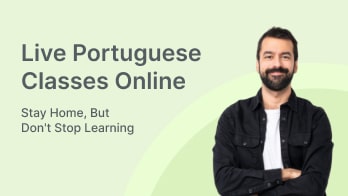Many times learners find themselves in a situation where they don’t have access to Portuguese classes, teachers or even native Portuguese speakers! But that’s not the end of the world! There still are plenty of Portuguese media resources that can help a learner learn Portuguese. Most of these resources can be accessed for free or found for very cheap- online or in a library. Many resources are available even through subscriptions of streaming services like Netflix or Spotify, something you may already be paying for!
For long Books have been our good friends! Even today not everything is available in electronic media. This means there’s a whole range of literature written in Portuguese available to help a learner master the Portuguese language. There are thousands of Portuguese books that make great learning resources for beginner and intermediate Portuguese learners, from short story compilations like Comédias para Se Ler na Escola* and the easy-to-follow Bear comic series to longer, to more substantive reads like the more classic novels Os Maias and Ensaio Sobre a Cegueira.
Using books to learn Portuguese is a great way to sharpen your reading skills and to understand how the Portuguese language is used in a whole wide range of contexts, from historical fiction to fairy tales to personal essays to collections of short stories to nonfiction and everything in between.
Keep a Portuguese dictionary handy.
Maintaining a language journal of unfamiliar Portuguese words, phrases and expressions help you build your vocabulary. Plus, you can get some extra speaking and Portuguese pronunciation practice by reading your collection aloud.

Learning Portuguese with Audio books, Audio clips, Podcasts, Music, Television shows, Talk shows, Portuguese News Channels, YouTube is a very effective way to start speaking and listening Portuguese language. With as many online Portuguese audio resources available that can teach one starting from the basics of Portuguese vocabulary and grammar to the most complex content of the language without needing to look at a page or a screen. These audio lessons are great for multitasking and learning passively, (many of them being free); one can listen to them in the car or in the background of another activity, like commuting to work, cooking dinner or taking a walk in your neighborhood. Portuguese podcasts like Todo Mundo Pod are great for beginners, and others like Durma Com Essa take a more in-depth look at Brazilian news and current events with Portuguese that’s more suitable for advanced learners. Listening to Portuguese songs can be a great learning method, too, especially if a group of lyrics is often repeated more than once, giving you plenty of opportunities to hear lyrics over and over. You can find many playlists of Portuguese songs on Spotify that are often organized by proficiency level, from beginner playlists to more advanced ones. But one must remember, that to really master a language, listening is not enough! You’ll have to supplement audio with ways to practice writing, reading, and speaking Portuguese, too.
Learning With Portuguese TV Shows And Portuguese Movies. Watching Portuguese movies and Portuguese TV shows is an excellent way to connect with the Portuguese language in a fun, engaging format. You can find a lot of good Portuguese-language content of all different genres and for all learning proficiency levels on streaming services like Netflix and Amazon Prime.
When you’re watching, you can choose to display subtitles in Portuguese for some extra reading practice. Try to avoid watching dubbed movies, as you won’t end up hearing any Portuguese! Watching gives you a chance to process what you’re hearing and you can record new words in your vocab journal and look them up for meanings in a dictionary.







